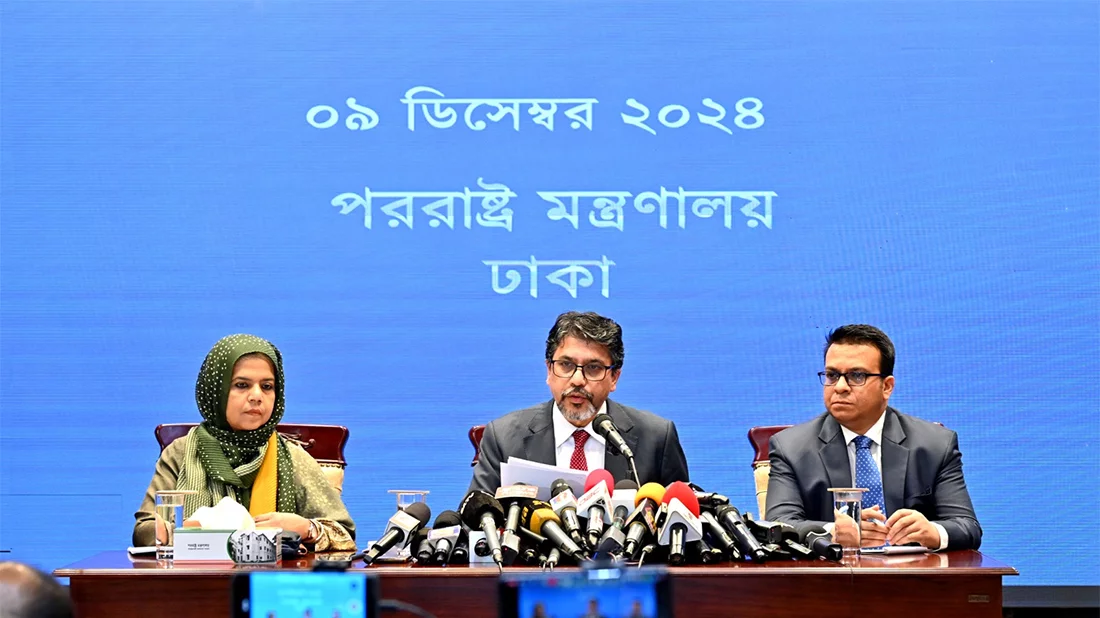Amid Delhi’s concerns over the safety and welfare of minorities, Bangladesh has reminded India that foreign comments on internal matters are inappropriate.
“We emphasized that this is an internal matter for Bangladesh and that foreign comments on our internal issues are inappropriate,” said Foreign Secretary Md Jashim Uddin after the Foreign Office Consultation (FOC) with his Indian counterpart, Vikram Misri, on Monday.
“I also reminded that Bangladesh refrains from commenting on the internal affairs of other countries, and such mutual respect should be extended by others as well,” he said, as India continues to raise concerns about the safety of the Hindu minority in Bangladesh.
Vikram Misri’s visit for the annual bilateral talks has been seen as an icebreaker amid tensions between the two countries following the political changeover in Bangladesh on August 5.
Jashim Uddin acknowledged a trust gap and said: “I emphasized the importance of building trust and confidence between the peoples of both countries and urged India to play an active role in preventing negative propaganda against Bangladesh.”
He, however, dismissed media reports on minority issues as misinformation.
“We brought to India’s attention the misinformation and false reports in the Indian media about the alleged mistreatment of minorities following the July-August revolution in Bangladesh. We requested the Indian government to take appropriate measures in this regard,” he said.
“We also highlighted that all religions in Bangladesh are practised freely and that there is no room for confusion or misrepresentation. The Bangladesh government has invited foreign journalists to observe the situation on the ground.”
Desire to work together
Just before the Indian foreign secretary’s visit, there had been a flurry of anti-India campaigns in Bangladesh. Major political party BNP also submitted a memorandum to the Indian High Commission in Dhaka on Sunday regarding recent anti-Bangladesh activities in India, including the attack on the Assistant High Commission in Agartala. The Indian government condemned the attack and arrested some of those involved.
Jashim Uddin expressed optimism about “further advancing existing relations with India” and discussed various aspects of the bilateral relationship.
“India is our closest neighbour, and our relationship with India is historical. In this context, during the consultations, both delegations agreed to further strengthen the existing ties between our countries in the future,” he said.
“We have expressed our desire to work closely with India to resolve all outstanding issues between our two countries as quickly as possible.”
His Indian counterpart said: “There is no reason why this mutually beneficial cooperation should not continue to serve the interests of both our peoples. To this end, I have underlined India’s desire to work closely with the interim government of Bangladesh.”
However, he also raised certain concerns.
“I conveyed our concerns, including those related to the safety and welfare of minorities. We also discussed some regrettable incidents of attacks on cultural, religious, and diplomatic properties,” said Vikram Misri.
Positive, constructive direction
“We expect an overall constructive approach to these issues by the Bangladesh authorities, and we look forward to moving the relationship forward in a positive, forward-looking, and constructive direction,” he added.
During the FOC, the delegations discussed a broad range of issues in the “extremely important” bilateral relationship between India and Bangladesh.
“Since the political changes in Bangladesh in August this year, there has been contact between our leaderships. The Prime Minister was the first world leader to congratulate the Chief Advisor on his assumption of office,” Misri said.
“The two had a very cordial telephone conversation thereafter, and the Chief Advisor also accepted the Prime Minister’s invitation to speak at the third Voice of the Global South Summit held in August this year. Since then, the External Affairs Minister and the Foreign Affairs Advisor have also been in touch.
“Today’s discussions have given both sides an opportunity to take stock of our relations, and I appreciate the opportunity for a frank, candid, and constructive exchange of views,” he said.
Sheikh Hasina’s presence has no Impact
One major point of contention is the presence of Sheikh Hasina in Delhi. The International Crimes Tribunal investigating the July-August killings has sought her return from India.
The Bangladesh Foreign Ministry, however, said that it would proceed only upon receiving formal requests from other relevant government departments.
“It’s a political decision, and we can seek her extradition via diplomatic messages or through our missions in India. For this, we don’t necessarily need an FOC,” Jashim Uddin said.
However, he asked Vikram Misri to convey to Sheikh Hasina that the Bangladeshi government does not approve of her statements from New Delhi.
“Her presence does not have any bearing on our relations. We will work with the government of the day,” Misri was quoted as saying.
Visit to reduce gap
Vikram Misri’s one-day visit included courtesy meetings with Chief Adviser Dr Muhammad Yunus and Foreign Affairs Adviser Md Touhid Hossain.
In the FOC, discussions covered minority safety, border killings, water-sharing agreements, trade barriers, energy cooperation, the Rohingya crisis, and consular matters.
“We requested India’s help in resolving longstanding border issues and stressed the importance of concluding the Teesta water-sharing agreement,” said Jashim Uddin.
Both sides reaffirmed their commitment to maintaining peace, stability, and cooperation in the region, with plans for further high-level engagements in the near future.
Bangla Tribune










